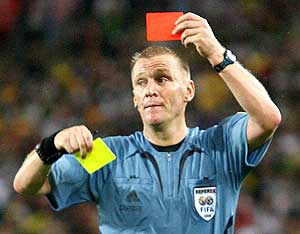In recent weeks we have written and thought much about the referees and their different fields of action, problems, curiosities that can be generated around them… and we have also learned to empathize and sympathize with them. We respect their decisions and we understand that they are human and can err in their actions, like everyone else. In addition to understanding and consent, we may also require certain aspects to the referees. As we reviewed for many blog entries, the character of the arbitrator shall be no negotiable as well as his personality. Communication, always positive, it is important to also achieve an improvement in the relationship with the players and the atmosphere generated around the arbitration. Both referees and players, coaches, fans, must do our part to make their work and our fun, are getting better and more effective and comfortable.
Finally, we want to thank all the officials who exercise their profession today. A profession that is usually easier to get insults and bad sides to home than joy. Therefore, and because they are still practicing and getting better these referees, we wish good luck to all of them. Because we love playing football, and without referees, it would not be possible.

Durante las últimas semanas hemos escrito y opinado mucho sobre los árbitros y sus diferentes ámbitos de actuación, problemas, curiosidades que se pueden generar sobre ellos… y hemos aprendido también a empatizar y simpatizar con ellos. Respetamos más sus decisiones y entendemos que son humanos y que pueden errar en sus acciones, como todos. Además de entender y consentir, también podemos exigir ciertos aspectos a los árbitros. Como hemos repasado durante muchas entradas del blog, el carácter del árbitro debe ser innegociable, así como su personalidad. La comunicación, siempre positiva, es importante para conseguir también una mejora de la relación con los jugadores y con el ambiente que se genera alrededor del arbitraje. Tanto los árbitros como los jugadores, entrenadores, aficionados, debemos poner de nuestra parte para que su trabajo y nuestra diversión, sean cada vez mejores y más eficaces y cómodos.
Por último, queremos dar las gracias a todos los árbitros que ejercen su profesión a día de hoy. Una profesión en la que normalmente es más fácil llevarse insultos y malas caras a casa que alegrías. Por ello, y porque sigan ejerciendo y cada vez mejor estos árbitros, deseamos mucha suerte a todos ellos. Porque nos encanta jugar al fútbol, y sin árbitros, no sería posible.
Imagen extraída de: taringa.net


